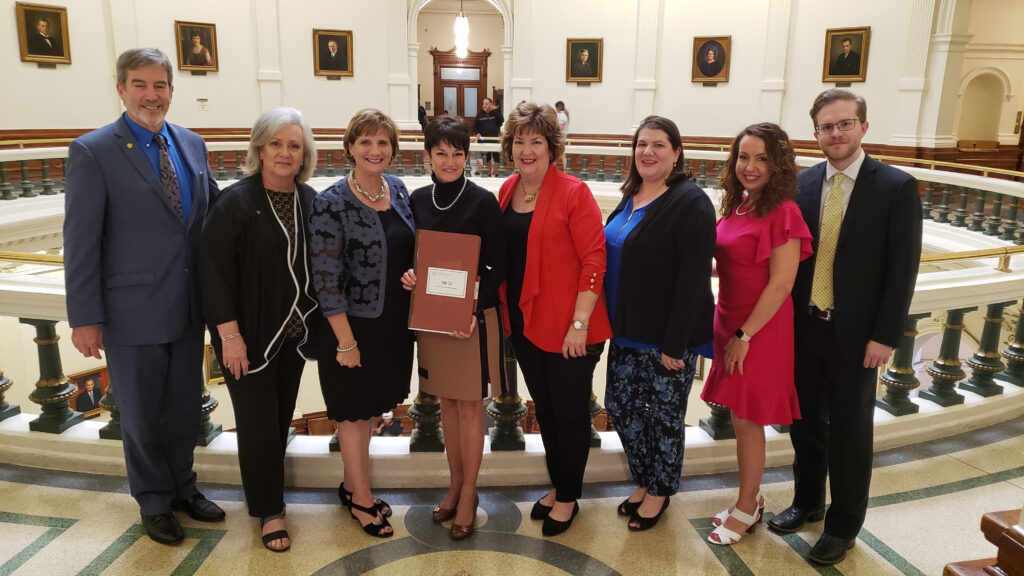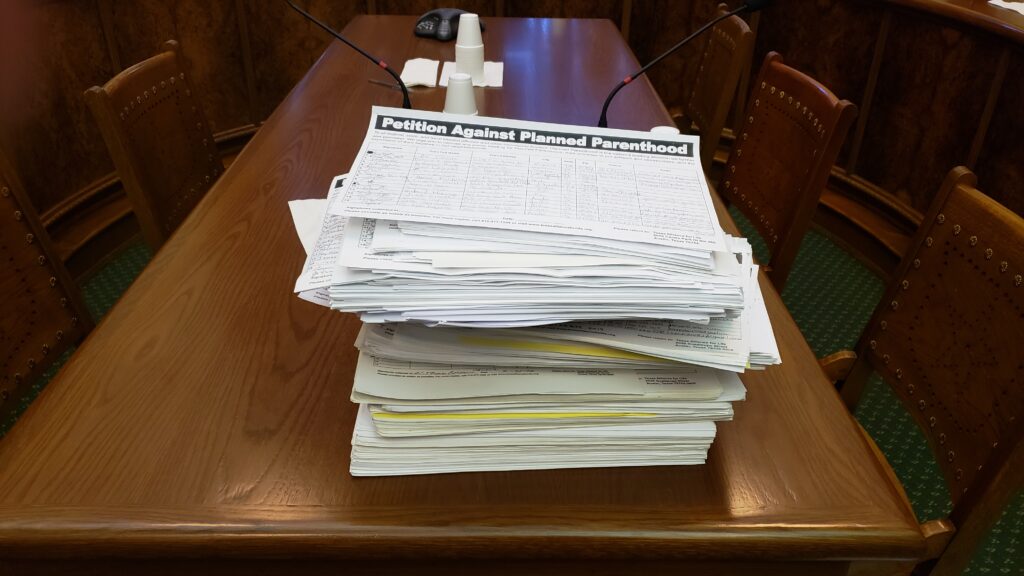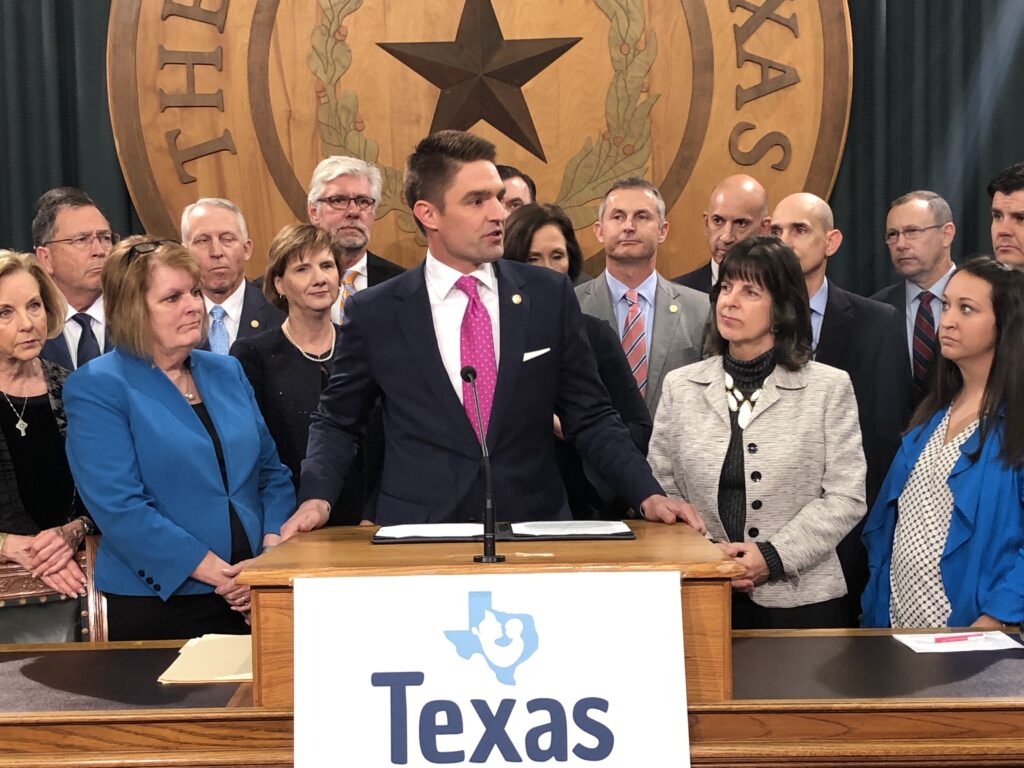Texas Alliance for Life is pleased that, under the leadership of Gov. Greg Abbott, Lt. Gov. Dan Patrick, and Speaker Dennis Bonnen, the Texas Legislature had another successful session. Highlights of the 20-week session, ending on Memorial Day, include the passage of HB 16, the Texas Born-Alive Infant Protection Act, SB 22 to protect taxpayers by defunding Planned Parenthood at the local level and a biennial budget that doubled funding for the State’s highly successful Alternatives to Abortion program. We are also delighted that the Legislature passed SB 24 to ensure women receive information on alternatives to abortion at abortion facilities. Additionally, we strongly supported HB 902 to increase penalties for assaulting a pregnant woman, which also passed.
Here is a short summary of the substantial accomplishments of the session.
Several potentially harmful bills were defeated, including a New York-style abortion-rights bill, SB 150; a dangerous election bill, HB 4082; and SB 2089, a bill that would force physicians and nurses to perform painful, medically inappropriate interventions indefinitely on terminally ill patients.
Lastly, we regret that the Trigger Ban, HB 2350 and SB 2160, to completely ban abortion when the Supreme Court overturns Roe v. Wade did not pass. That is a new idea for Texas, and new ideas frequently take multiple sessions to pass. The ban on wrongful birth lawsuits, HB 4199, also failed to pass.
What follows is a detailed recap of the session.
Defund Planned Parenthood at the Local Level

SB 22, by Sen. Donna Campbell (R-New Braunfels) and Rep. Candy Noble (R-Lucas), bans contracts between a governmental entity (the state, cities, counties, school districts, and hospital districts) and abortion providers and their affiliates. The bill passed by wide margins in both chambers, despite not being passed in 2017.
At the committee hearing on the bill, Texas Alliance for Life provided a “Petition Against Planned Parenthood” signed by 17,000 individuals, including thousands in West Texas where Planned Parenthood announced their intention to build a new facility, presumably to perform thousands of abortions each year.

Months before the session an egregious example took place in the City of Austin, who renewed a contract with Planned Parenthood to allow the affiliate to rent a city-owned building for $1 per year for 20 years, with an option to extend for an additional 20 years. The fair market value of the lease is $100,000 per year.
Texas Alliance for Life did extensive open record requests and discovered contracts with Planned Parenthood and other abortion providers in several areas of Texas, including Harris, McClennen, Tarrant, and Travis Counties.
Truly, women do not need Planned Parenthood. The State’s Healthy Texas Women program offers all of the same health services to low-income women as Planned Parenthood, and more, except abortion. The Healthy Texas Woman program has more than 275,000 women enrolled served by more than 5,000 providers many of which offer comprehensive primary care, a standard Planned Parenthood fails to meet at its site, which number only a few dozen.
Planned Parenthood does not offer childbirth services, but the State’s Medicaid program funds more than half of all births in Texas. The State’s Alternatives to Abortion program serves women at more than 130 sites.
Texas Born-Alive Infant Protection Act

The Texas Born-Alive Infant Protection Act, HB 16 by Rep. Jeff Leach (R-Plano) and Sen. Lois Kolkhorst (R-Brenham), requires appropriate medical treatment for infants born alive after an abortion. This bill was a top priority for Texas Alliance for Life. TAL’s executive director Dr. Joe Pojman testified in support of the bills in both the House and Senate committee hearings; explaining that the Legislature previously passed a bill to “recognize that a child born after an abortion has the same rights and privileges as any other child born alive” had no penalties.
The Texas Born-Alive Infant Protection Act establishes civil and criminal penalties in the event an abortion doctor fails to attempt to save the life of a baby. The mother would continue to be protected from any liabilities, in accordance with the current state law.
Also testifying in favor of the bill were three born-alive abortion survivors: Claire Culwell, Gianna Jesson, and Carrie Fischer. These brave women provided faces to the born-alive survivor debate, showing babies do survive abortion attempts. They grow to become spouses, parents, authors, speakers, and valuable contributors to society in many other ways.
Alternatives to Abortion Information Act

In 2011, the Texas Legislature passed HB 15 with the intent that women considering an abortion are given specific options and information before consenting to the abortion. The physician who is to perform the abortion is required to verbally give information to the woman about the abortion procedure, its risks, and available alternatives. Also, the 2011 law requires that abortion doctors “provide” to each woman the State’s free informed consent brochures, A Woman’s Right to Know informational brochure and resource directory.
Compelling evidence suggests that abortion providers fail to comply with the law.
Testimony of former abortion facility staff indicates at least some abortion doctors are performing informed consent sessions via conference calls with multiple clients simultaneously.
Our open records requests with the Texas Health and Humans Services Commission revealed that only a few thousand brochures were requested by abortion providers for distribution to women in 2018, compared to 55,000 abortions that year.
SB 24, the Alternatives to Abortion Information Act by Sen. Eddie Lucio Jr. (D-Brownsville) and Rep. Chris Paddie (R-Marshall) passed by wide margins in the Senate and House with the strong support of Texas Alliance for LIfe. It clarifies the intent of HB 15 by ensuring that any phone consultation is done in private, and the physician or physician’s agent is required to physically “hand” the brochures directly to the woman before the abortion.
Increase Penalties for Assaulting a Pregnant Woman

HB 902, by Rep. Brooks Landgraf (R-Odessa) and Sen. Joan Huffman (R-Houston) to protect pregnant women from assault, passed unanimously in the Texas House and Senate. HB 902 will increase the penalty for assaulting a pregnant woman from a Class A misdemeanor to a third-degree felony. The bill is the brainchild of Kortney Williams, the assistant district attorney of Ector County and former intern at Texas Alliance for Life.
Doubled Funding for the State’s Alternatives to Abortion Program
The State’s biennial Appropriations Act, HB 1, by Sen. Jane Nelson (R-Flower Mound) and Rep. John Zerwas (R-Richmond), doubled funding to $80 million for the highly successful Alternatives to Abortion program. Rep. Matt Krause (R-Fort Worth) authored the amendment in the House to achieve that. The program is expected to serve more than 100,000 clients per year at more than 130 pregnancy resource centers and other sites by 2020.
Trigger Ban on Abortion
We were disappointed that one of our top priorities for this session, the Trigger Ban on Abortion, SB 2160 by Sen. Angela Paxton (R-McKinney) and HB 2350 by Rep. Giovanni Capriglione (R-Southlake), did not pass. The House Judiciary and Civil Jurisprudence Committee considered it in committee, but it was not voted out. This bill would have restored protection to unborn children from abortion, beginning at fertilization, when and to the extent that the Supreme Court reverses Roe v. Wade. Seven states have passed trigger bans, and others considered passing similar laws.
Ban on Wrongful Birth Lawsuits

Another disappointment was that the bill to ban wrongful birth lawsuits, HB 4199 by Rep. Dan Flynn (R-Van), did not pass. It was voted favorably from the House Judiciary and Civil Jurisprudence Committee. However, it was not set on the House calendar for consideration
A wrongful birth lawsuit is brought by the parents of a child born with a disability, such as Down syndrome, alleging that they were deprived of the opportunity to be informed of the disability in time to abort the child. The claim for damages is based on the cost to parents of raising an unexpectedly disabled child for the duration of that child’s life. These suits send the terrible message that a child with a disability should have been aborted. The physician is liable for the disability that he or she did nothing to cause. 22 states do not recognize wrongful birth lawsuits.
Abortion Bills We Opposed
Before the session began, several legislators filed New York-style bills to roll back the substantial pro-life gains made in recent years. All of the explicit attacks on our pro-life abortion laws gained no traction and were defeated, a credit to both the House and Senate leadership and the number of pro-life members of each chamber.
Authors of the hostile bills included Rep. Jessica Farrar (D-Houston), Rep. Sheryl Cole (D-Austin), and Sen. Jose Rodriguez (D-El Paso). In particular, Sen. Rodriguez’ Whole Woman’s Health Act, SB 150, would establish a right to abortion throughout pregnancy, allow non-physicians to perform abortions, and explicitly repeal the State’s abortion reporting and complications reporting requirements, informed consent requirements, humane disposition requirements, the ban on trafficking baby body parts, and the ban on Medicaid funding for abortions.
Open Adoption Birth Certificates
Texas Alliance for Life takes the position that birth parents who place a child for adoption and want to remain anonymous should have that right protected by law. A birth mother might be a victim of rape or other circumstances that make her anonymity critical to her decision to choose childbirth and adoption over abortion.
HB 2725 by Rep. Gina Calanni (R-Katy) would open birth records against the birth parents’ wishes. We opposed this bill, and our Executive Director Dr. Joe Pojman testified against it. HB 2725 died before reaching the House floor.
End of Life Bills
Several bills affecting terminally ill patients were considered this session. Texas Alliance for Life categorically opposes assisted suicide and euthanasia. We recognize that sometimes the wishes of families conflicts with the ethical and medical judgment of the attending physician to not have to provide harmful interventions at the end of life.
The Texas Legislature set up a dispute resolution process 20 years ago with the passage of the Texas Advance Directives Act (TADA), signed by then-Gov. George W. Bush, that balances the two. Texas Alliance for Life has a goal of maintaining and strengthening the generally successful process. In our view, physicians typically should and do follow the wishes of patients and families’ directives regarding care at the end of life. However, in rare cases, families demand harmful interventions that are medically inappropriate and cause great suffering without a reasonable chance of helping the patient. (See a more extensive description of our position in this article in our blog titled, “End of Life Laws in the 86th Legislature,” set to come out next week.)
To that end, we supported SB 2355 by Sen. Eddie Lucio Jr. (D-Brownsville) and Rep. Garnet Coleman (D-Houston). That bill would improve hospital ethics committees which review the decisions of physicians in disputes by assuring decisions were not discriminatory decisions based on financial conflicts of interest or disabilities of the patient.
We opposed SB 2089 by Sen. Bryan Hughes (R-Mineola) and Rep. Richard Raymond (D-Laredo), and similar harmful bills authored by Sen. Brandon Creighton (R-Conroe) and Rep. Tan Parker (R-Flower Mound), which would effectively remove the dispute resolution process and require harmful interventions for dying patients indefinitely at the demand of the family.
Additionally, we are part of a large coalition of organizations that opposed those bills, including the Texas Catholic Conference of Bishops, Texans for Life, the Coalition of Texans with Disabilities, the Catholic Health Association, the Texas Medical Association, and the Texas Hospital Association.
The only bill to be considered on the Senate floor was SB 2089. During the debate, Sen. Hughes accepted an amendment by Sen. Lucio to completely strike the entire language of SB 2089, which we opposed, and substitute the language of SB 2355, which we supported. The Senate then passed SB 2089 with language fully supported by TAL.
When SB 2089 went to the House, it was not set for debate and did not pass. There was no assurance it would not be amended back to its original, objectionable form, and we opposed moving it to the House floor.
Texas Alliance for Life made multiple attempts to meet with Sen. Hughes and Sen. Creighton to discuss their end of life bills. Unfortunately, neither author was willing to meet to discuss their bills. We do thank Rep. Parker for discussing the issue with us at length.
Election Laws
Texas Alliance for Life typically does not weigh in on election laws. However, we cannot pass good policies in the legislature without legislators who represent their constituents. That cannot happen without free and fair elections. When a policy endangers free and fair elections, we weigh in.
A very dangerous bill by Rep. Mays Middleton (R-Wallisville) would have done just that. HB 4082, strongly promoted by James Dickey, chairman of the Republican Party of Texas, would allow the state Republican and Democratic parties to determine their own rules for conducting the primary elections by superseding state laws.
Under HB 4082, the state parties’ executive committees could establish “purity tests” to determine who is fit to be on that party’s primary election ballot. For example, the Democratic Party of Texas could determine that only candidates who sign a pledge to oppose abortion bans could compete in the Democratic Primary Election. Likewise, the Republican executive committee could require candidates to pledge to support an “abolitionist” abortion ban that includes the possibility of the death penalty for women who have abortions.
Dr. Pojman testified against this bill in the House Elections Committee. “This bill takes the power to nominate candidates away from the primary voters and gives it to party bosses who meet in Austin,” he said, referring to the State Republican and State Democratic Executive Committees. Fortunately, that bill died in committee.
Bills We Did Not Recommend
Texas Alliance for Life’s goal is to completely protect unborn babies from abortion beginning at fertilization. However, at this time we did not recommend the Texas Legislature pass bills that have little chance of surviving a federal court challenge because they banned abortions on “non-viable” unborn children, which the Supreme Court currently does not permit.
If passed, these bills would seriously set back, not advance, protections for unborn children. They would save no babies’ lives because the federal courts would not permit them to go into effect. They would result in more bad precedent in the wake of Roe v. Wade (1973) and Planned Parenthood v. Casey (1992). And they also would result in substantial attorneys’ fees the State of Texas would be required to pay to the plaintiffs, thus strengthening the abortion industry and the organizations that represent them in court, including the ACLU and the Center for Reproductive Rights. None of those bills passed
- HB 896 by Rep. Tony Tinderholt (R-Arlington) banned abortions throughout pregnancy including on non-viable babies, which the Supreme Court does not permit. It required the Texas Attorney General to ignore the Supreme Court, which is not possible. And it criminalized abortion for women on whom an abortion is performed, which Texas Alliance for Life will never support. Women were never prosecuted in Texas or in any other state prior to Roe v. Wade. Claims that Roe struck down the Texas abortion ban because women were not prosecuted, i.e., a lack of “equal protection,” are patently false. In Roe, the Supreme Court found a right to privacy in the 14th Amendment, and they extended it to include a right to abortion, entirely unrelated to equal protection.
- HB 1500 by Rep. Briscoe Cain (R-Houston) banned abortions on unborn babies once the heartbeat is detected. This law has been passed in several states and has been struck down in all of them. Requests by Arkansas and North Dakota for the Supreme Court to review the cases have been denied.
- SB 1033 by Sen. Kelly Hancock (R-North Richland Hills) and Rep. Matt Schaefer (R-Tyler) would ban abortions on non-viable babies for discrimination reasons (sex, race, ethnicity, disability) and on babies who are not disabled but will die before or shortly after birth because of a “severe fetal abnormality.” Compelling pro-life testimony was given in both House and Senate committees. The Senate passed SB 1033, but it was not set for debate on the House floor and did not pass. Texas Alliance for Life fully supports the intent of SB 1033. We never support abortions, including discrimination abortions and abortions on babies who are fatally ill. However, the unfortunate reality is that SB 1033 would not save any lives. Notably, the Supreme Court recently let stand a lower court’s ruling that struck down an Indiana law that also banned discrimination abortions. In 2018 the 7th Circuit Court of Appeals had ruled that, because Indiana’s law prevented abortions on non-viable babies, it could not be enforced. We have a detailed explanation in our blog, “Why TAL Doesn’t Recommend a Ban on Discrimination Abortions.”

